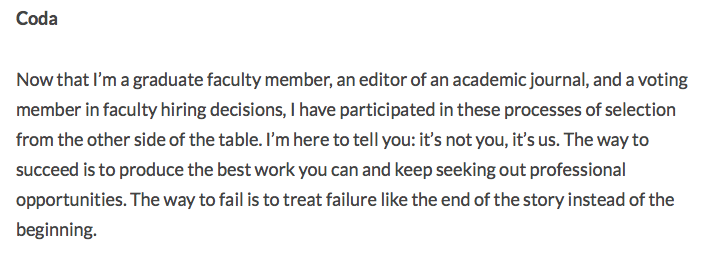You have /5 articles left.
Sign up for a free account or log in.
Writing at her personal blog, Ellie Mackin identifies something that’s been nagging me about the “CVs of Failure” that now make their way through academic circles.
While they are no doubt well-intentioned, Dr. Mackin points out that at their heart, these “CVs of Failure” are, in reality, success stories.
I do not mean to specifically pick on the individual who posted the particular “CV of Failure” that provoked Dr. Mackin’s response, but its concluding “coda” displays the most common shortcoming of the genre.

And here we are: Work hard. Learn from your mistakes. If at first you don’t succeed, try and try again, and eventually, success will come for you too.
In the parlance of Donald Rumsfeld, these are “known knowns.” In fact, they’re such known knowns they are clichés, and also, in the context of the world of academia they are lies.
Or at least not the whole truth. Sure, these CV’s are littered with all the things that didn’t pan out for the individuals, but given that these pieces are almost invariably written from the point of view of someone who has succeeded in arriving at a place sufficiently secure that they can out their failures without concern, the result is thin gruel indeed when it comes to offering useful insights.[1]
If we’re going to write about success and failure, rather than featuring the known knowns – work hard, fail, try again - I think we need to talk more about the unknown knowns behind those “CVs of Failure” that inevitably end in success.
Though I am a failure, my own academic career is too haphazard and unintentional to serve as an example, but I thought I could perhaps illustrate how the unknown knowns have worked for me in achieving my status as contributing blogger for Inside Higher Ed.
No, it’s not a tenure-track professorship, but it’s a pretty decent gig, the kind of steady freelance work that has allowed me to transition out of the full-time contingent academic workforce and into a full-time writing career.
I 100 percent deserve this job. I work hard and write lots of words. I think I’m good at it and my editors seem to agree. I’ve been doing it for five-plus years.
Like every other writer, I’ve suffered my share of rejection along the way. I submitted a couple hundred times before publishing my first short story. I’ve written a full-length failed (by my own judgment) novel manuscript. My novel that was published required finding a new agent when my original one expressed no confidence in the book.
I was threatened with a lawsuit by the author and publisher of a beloved series of children’s books which resulted in the pulping of a parody book that was in multiple printings before it was even released.
So yeah, failures, I got ’em. We all do. That's the point.
But how did I achieve this particular “success”? Here’s some things you might not know.
I first started writing for IHE as a guest of Oronte Churm, who needed to take time off in order to transition to a new tenure-track job at McNeese State University.
I met Churm in 2001 at the University of Illinois where he was assigned as my faculty mentor when I was a new lecturer in the English department. While I was qualified for the job, my path to securing the position was considerably smoothed by my relationship with Philip Graham, tenured faculty at Illinois, who had been my undergraduate creative writing professor and had also played a role in helping me get into graduate school at, wait for it, McNeese State (’97 M.A./M.F.A.).
After a year at U of I, I moved to Virginia Tech. In June of 2003, I got a call from Dave Eggers, asking me if I could “help out” with the McSweeney’s Internet Tendency website.
How is one so lucky, you’re wondering, to get a call from one of my generation’s most accomplished writers/activists with a job offer?
Easy. Marry someone who was high school friends with Dave Eggers so you meet him and become friends when you’re both still young people.[2]
Now working as the editor for McSweeney’s Internet Tendency and fairly desperate to expand the scope of what we published at the time, I hit on the idea of a column written from the perspective of a contingent faculty member. At first, I thought about doing it myself, but that I remembered I had a better candidate.
My old friend Churm. “Dispatches From Adjunct Faculty at a Large State University” ran on McSweeney’s from 2005 to 2008, at which time Churm got an offer he couldn’t refuse from an upstart higher education website called Inside Higher Ed.
That’s not all. The reason Churm needed a hiatus in order to move to Lake Charles, La., to start his job at McNeese State is because I introduced him as a candidate to people working in the department there who had been in my grad school cohort in the mid-’90s.[3]
What do we call this? Luck? Connections? Where did it come from? Who or what gets the credit?
I have no idea. But I also know that without all of these things happening, I wouldn’t be writing for this space today.
At the time of filling in for Churm I had accomplished some things as a writer, but I had no track record as a “blogger” per se. There were likely many people already working at writing about higher ed who were far more qualified for the position, but they didn’t get the chance.
I did.
I believe this particular success is deserved. In fact, in my private times, when I take my ego out for a stroll, you might find me ruminating on how I deserve more, that in a just world, maybe some of the dead wood at the New York Times editorial page could shove over.[4]
But there’s an important difference between my work as a writer and my successes and failures versus what’s happening in our academic labor marketplaces.
Academia is a “system” in ways writing is not. There are no structures in place with control over the supply of writers. My apprenticeship is not formally overseen with a transfer of money from me to a mentor. Tom Friedman endlessly repeating himself at the Times is not predicated on me publishing here for less money and prestige. My work at Inside Higher Ed is not supported by a group of unpaid writers beneath me.
In fact, in the larger publishing world, it’s often the superstar authors whose success helps subsidize risks taken on less commercial writers.
At research universities, particularly in the humanities, we have tenured faculty whose jobs are predicated upon an apprenticeship system for future scholars that, in many disciplines, offers extremely limited odds for success in achieving sustainable, decent-paying positions.[5]
Worse, those former apprentices often become contingent faculty working as human shields, engines that generate surplus dollars to the institution by teaching general education courses for low wages, surpluses that support the privileges of the tenured.
These systemic inequalities and the ways they protect the privileges of some at the expense of others should not be unknown knowns at this point.
When “CVs of Failure” fail to acknowledge and grapple with this reality, no matter how encouraging and well-meaning they may mean to be, they only serve to perpetuate the injustice.
Articulating the ways we have been lucky or privileged and the role that luck and/or privilege has played in success does not diminish that success. We can only play the hands we’re dealt, and having been dealt a good hand doesn’t require any penance or guilt.
But we should strive to be honest. Let’s have some “CVs of Failure” that seek to tell more complete stories.
[1] Let me stipulate that I am not arguing that the world owes a professorship to everyone who does the “right” things. We cannot guarantee outcomes, even for those who perform entirely admirably. But, the proportions of those who do the right things and yet still are flushed out of the academic labor system as waste should be cause to look at all aspects of that system. As to what should be or could be changed, that’s something for a post of its own.
[2] I don’t have the space to detail the story of how my future wife and I wound up on our first date, but the number of events that had to happen is mind-boggling. Yes, I’m guilty of some hindsight bias here, but even taking that into account, it’s something of a miracle, and almost, but not quite, makes me believe in fate.
[3] Churm was obviously hugely qualified for that gig, and while I’m biased, his collection of essays, Pirates You Don’t Know, and Other Adventures in the Examined Life, is a devastating book.
[4] Of course, I don’t run in those circles. Of the 13 main op-ed writers for the Times, only three (Charles Blow, Frank Bruni and Andrew Rosenthal) even attended a public undergraduate institution, and Bruni is a grad of Columbia’s J-school. Andrew Rosenthal might’ve gotten a leg up -- he was editorial page editor before settling into a kind of emeritus columnists position -- by being the son of Abe Rosenthal, a former executive editor of the Times.
[5] What Marc Bousquet called academic “waste product” in his 2008 book, How the University Works.

